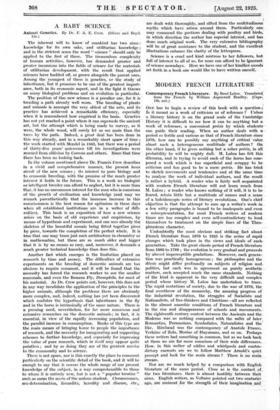A BABY SCIENCE
Animal Genetics. By Dr. F. A. E. Crew. (Oliver and Boyd.
The inherent will to know of mankind has two aims : knowledge for its own sake, and utilitarian knowledge ; and in the strictest sense the word " science " should only be applied to the first of these. The tremendous complexity of human activities, however, has demanded greater and greater incursions into the fields of science for the materials of utilitarian development, with the result that applied sciences have budded off, Or grown alongside the parent ones. AmOng the youngest of these is genetici, or the study 'of inheritance, 'but it promises to be one of the greatest import- ance, both in its economic aspect, and in the light it throws on many biological problems and on evolution in particular.
The position of this new science is a peculiar one, for it is treading a path already well worn. The breeding of plants and aninials is amongst the very oldest of the arts, and its practice has achieVed a reinarkable efficiency, especially when it is remembered how empirical is the basis. Genetics has not yet reached a point where it can supersede the ancient. art, :bid the attempt which is betrig Made to survey, as it were, the whole wood, will surely let us see more than the trees by the path. Indeed, a great deal has -.been done in this Way already, and in a remarkably short space of time ; the work started with Mendel in 1865, but there was a period of thirty-five years'. quiescence till his investigatimis were• rescued from oblivion by Correns and ()theta. Since that time there has been no looking back.
In the vohune mentioned above Dr. Francid Crew, deScribes in a vivid and comprehensive Manner, the present locus standi of thenew science ; its interest to pure biology and to economic breeding, with the promise of the much greater interest it holds in the future. This is a work no biologist or intelligent breeder can afford to neglect, but it is more than that, it has no uncommon interest for the man who is conscious of the growth of civilization and knowledge (and may we remark parenthetiCally that the immense increase in this consciousness is' the best reason for optimism in these days when all established institutions are in a welter of diffi- culties). This book is 'an exposition of how a new science arises on the basis of old experience and empiricism, by means of hypothesis and experiment, and one sees already the skeleton of the beautiful mosaic being fitted together piece by piece, towards the completion of the perfect whole. It is true that one may trace just such architecture in chemiStry or in mathematics, but these are so much older and bigger that it is by no means so easy, and, moreover, it demands a much greater technical knowledge than does this.
Another fact which emerges is the limitation placed on research by time and money. The difficulties of extensive experiments on the breeding of domestic animals are too obvious to require comment, and it will be found that the necessity has forced the research worker to use the smaller mammals, and even the Banana Fly, Drosophila, for most of his material. As Dr. Crew points out, however, this does not in any way invalidate the application of the principles to the higher animals, although the problems there are obviously more complex, and, indeed, nothing has yet been discovered which confutes the hypothesis that inheritance in the fly and in the horse is intrinsically of the same nature. There is a pressing need, nevertheless, for far more numerous and extensive researches on the domestic animals ; in fact, it is essential, in view of the rapidly increasing population, and the parallel increase in consumption. Books of this type are the main means of bringing home to people the importance of research, and the necessity for inaugurating and supporting schemes to further knowledge, and especially for impressing the value of pure research, which in itself may appear quite pointless ; and by so doing they are of the greatest service to the community and to science.
There is not space, nor is this exactly the place to comment particularly on the scientific detail of the book, and it will be enough to say that it covers the whole range of our present knowledge of the subject, in a way comprehensible to those to whom it is entirely new, but is not a " popular treatise " such as earns the scorn of the serious student. Chromosomes, sex-determination, fecundity, heredity and disease, etc., are dealt with thoroughly, and sifted from the multitudinous myths which have arisen around them. Particularly one may commend the portions dealing with poultry and birds, in which direction the author has especial interest, and has done much original work. The very extensive bibliography will be of great assistance to the student, and the excellent illustrations enhance the clarity of the letterpress.
Science is a cruel and kind mistress to her followers, but full of interest to all of us, for none can afford to be Ignorant of science nowadays. Here we have one of her kindlier moods set forth in a book one would like to have written oneself.


































 Previous page
Previous page